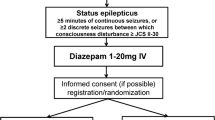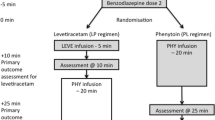Abstract
For the management of status epilepticus (SE), lorazepam (LOR) is recommended as the first and phenytoin or fosphenytoin as the second choice. Both these drugs have significant toxicity. Intravenous levetiracetam (LEV) has become available, but its efficacy and safety has not been reported in comparison to LOR. We report a randomized, open labeled pilot study comparing the efficacy and safety of LEV and LOR in SE. Consecutive patients with convulsive or subtle convulsive SE were randomized to LEV 20 mg/kg IV over 15 min or LOR 0.1 mg/kg over 2–4 min. Failure to control SE within 10 min of administration of one study drug was treated by the other study drug. The primary endpoint was clinical seizure cessation and secondary endpoints were 24 h freedom from seizure, hospital mortality, and adverse events. Our results are based on 79 patients. Both LEV and LOR were equally effective. In the first instance, the SE was controlled by LEV in 76.3% (29/38) and by LOR in 75.6% (31/41) of patients. In those resistant to the above regimen, LEV controlled SE in 70.0% (7/10) and LOR in 88.9% (8/9) patients. The 24-h freedom from seizure was also comparable: by LEV in 79.3% (23/29) and LOR in 67.7% (21/31). LOR was associated with significantly higher need of artificial ventilation and insignificantly higher frequency of hypotension. For the treatment of SE, LEV is an alternative to LOR and may be preferred in patients with respiratory compromise and hypotension.
Similar content being viewed by others
References
Alldredge BK, Gelb AM, Isaacs SM, Corry MD, Allen F, Ulrich S, Gottwald MD, O’Neil N, Neuhaus JM, Segal MR, Lowenstein DH (2001) A comparison of lorazepam, diazepam, and placebo for the treatment of out-of-hospital status epilepticus. N Engl J Med 345:631–637
Claassen J, Hirsch LJ, Mayer SA (2003) Treatment of status epilepticus: a survey of neurologists. J Neurol Sci 211:37–41
De Smedt T, Raedt R, Vonck K, Boon P (2007) Levetiracetam: part II, the clinical profile of a novel anticonvulsant drug. CNS Drug Rev 13(1):57–78
Knake S, Gruener J, Hattemer K, Klein MK, Bauer S, Oertel HW, Hamer HM, Rosenow F (2008) Intravenous levetiracetam in the treatment of benzodiazepine refractory status epilepticus. J Neurol Neurosurg Psychiatry 79:588–589
Leppik IE, Derivan AT, Homan RW, Walker J, Ramsay RE, Patrick B (1983) Double-blind study of lorazepam and diazepam in status epilepticus. JAMA 249:1452–1454
Misra UK, Kalita J, Patel R (2006) Sodium valproate vs phenytoin in status epilepticus: a pilot study. Neurology 67:340–342
Ng YT, Hastriter EV, Cardenas JF, Khoury EM, Chapman KE (2010) Intravenous levetiracetam in children with seizures: a prospective safety study. J Child Neurol 25:551–555
O’Brien TJ, Cascino GD, So EL, Hanna DR (1998) Incidence and clinical consequence of the purple glove syndrome in patients receiving intravenous phenytoin. Neurology 51:1034–1039
Ramael S, Daoust A, Otoul C, Toublanc N, Troenaru M, Lu ZS, Stockis A (2006) Levetiracetam intravenous infusion: a randomized, placebo-controlled safety and pharmacokinetic study. Epilepsia 47:1128–1135
Ruegg S, Naegelin Y, Hardmeier M, Winkler DT, Marsch S, Fuhr P (2008) Intravenous levetiracetam: treatment experience with the first 50 critically ill patients. Epilepsy Behav 12:477–480
Treiman DM, Meyers PD, Walton NY, Collins JF, Colling C, Rowan AJ, Handforth A, Faught E, Calabrese VP, Uthman BM, Ramsay RE, Mamdani MB (1998) A comparison of four treatments for generalized convulsive status epilepticus. Veterans Affairs Status Epilepticus Cooperative Study Group. N Engl J Med 339:792–798
Tripathi M, Vibha D, Choudhary N, Prasad K, Srivastava MV, Bhatia R, Chandra SP (2010) Management of refractory status epilepticus at a tertiary care centre in a developing country. Seizure 19:109–111
Acknowledgments
We thank Mr. Rakesh Kumar Nigam for secretarial help.
Conflict of interest
None.
Author information
Authors and Affiliations
Corresponding author
Rights and permissions
About this article
Cite this article
Misra, U.K., Kalita, J. & Maurya, P.K. Levetiracetam versus lorazepam in status epilepticus: a randomized, open labeled pilot study. J Neurol 259, 645–648 (2012). https://doi.org/10.1007/s00415-011-6227-2
Received:
Revised:
Accepted:
Published:
Issue Date:
DOI: https://doi.org/10.1007/s00415-011-6227-2




